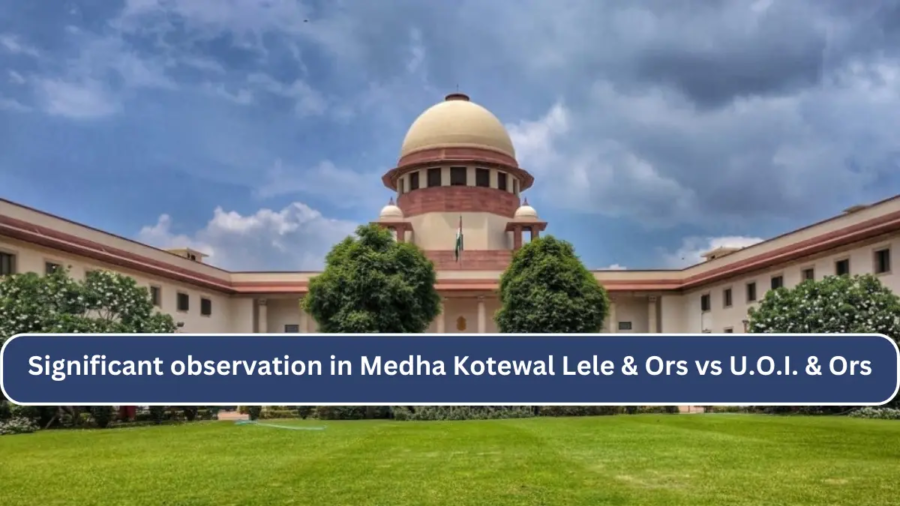Citation: (2013) 1 SCC 297
Jurisdiction: Supreme Court of India
Date of Decision: 19th October 2012
Case Overview
Concerns about the effective application of the Vishaka Guidelines, which were created by the Supreme Court in 1997 to address workplace sexual harassment, gave rise to the case of Medha Kotwal Lele v. Union of India. Because state employees disregarded the rules, harassment incidents continued.
The Court emphasized how crucial it is to put the Vishaka Guidelines into practice in order to guarantee women’s dignity and gender parity in the workplace. It criticized some states for their insufficient efforts to comply with the guidelines and offered detailed instructions on how to do so:
- The HC directed states to revise their Central Civil Service (conduct) Rules and Standing Orders.
- For the purpose of handling complaints of harassment, states must set up sufficient Complaint Committees led by women.
- Officials working for the state must put in place systems for efficiently enforcing regulations.
- Professional associations like the Indian Medical Association, Indian Bar Association, and others are responsible for maintaining compliance in their respective fields.
- The Court stressed that noncompliance could be resolved by going through the state’s High Court. This ruling highlights the continuous fight for gender parity and the necessity of strong legal protections against sexual harassment in Indian workplaces.
Facts
The case unfolds within the ongoing efforts to address the pervasive issue of sexual harassment against women in the Indian workplace, pursued through legal and legislative avenues. Stemming from a landmark 1997 Supreme Court case, Vishaka and Others v. State of Rajasthan and Others (1997) 6 SCC 241, which arose from the brutal gang rape of a publicly employed social worker, the Court affirmed women’s constitutional rights to dignity, equality, and the pursuit of any profession free from sexual harassment. Recognizing the absence of legislative safeguards, the Court established the Vishaka Guidelines as an interim measure to prevent and address workplace sexual harassment until relevant protective legislation could be enacted by Parliament.
Despite the passage of the “Protection of Women against Sexual Harassment at Workplace Bill 2010” by the Lok Sabha in September 2012, its enactment remains pending in the Rajya Sabha. The current case emerged when Medha Kotwal Lele, coordinator of Aalochana, along with other women’s rights advocates, petitioned the Court, citing numerous instances of sexual harassment and asserting that the Vishaka Guidelines were inadequately enforced. The petitioners argued that women continued to face harassment due to breaches of the guidelines by state functionaries, leading to their suffering and indignity.
The Court’s focus was on assessing whether individual state governments had implemented the necessary procedural and policy changes mandated by the Vishaka Guidelines and previous court orders. This context underscores the ongoing struggle to address workplace sexual harassment effectively and ensure the protection and dignity of women in India’s workforce.
Laws Cited
National laws:
- Article 141 Constitution of India
- The Vishaka Guidelines
- Protection of Women against Sexual Harassment Bill 2010 (the Bill) – still pending.
- Central Civil Service (conduct) Rules, 1964 (CCS Rules) • Industrial Employment (Standing Orders) Rules.
International laws:
- The Beijing Platform for Action
Court’s Observation
The Court cited the Beijing Platform for Action, which highlights how physical, sexual, and psychological abuse of women affects them in all societal strata and compromises their human rights and freedoms. The statement conveyed dissatisfaction with India’s gender equality performance, emphasizing the inadequate representation of women in legislative assemblies despite constitutional pledges towards gender equality and prevention of sexual harassment.
Declaring that the Vishaka Guidelines must be followed to the letter in order to guarantee that women can work with respect and dignity, the Court censured a number of states for their inadequate adherence. It mentioned inconsistent adherence to court directives for legislative alignment with the Vishaka Guidelines and referenced prior findings of inadequate implementation.
The Court condemned ineffective laws with lax enforcement and mere lip service, emphasizing the need to prevent all forms of violence against women. It emphasized how crucial the Vishaka Guidelines are as a substantive measure up until the relevant laws are passed.
The Court issued directives to address the deficiencies: states were required to amend their Central Civil Service Rules and create sufficient Complaint Committees led by women to handle complaints of harassment. State employees also need to properly enforce the regulations. Professional associations such as the Medical Council of India and the Bar Council of India need to make sure that their affiliates follow the rules.
In the event that the Vishaka Guidelines and its instructions are not followed, the Court authorized those who have been wronged to pursue remedies through the High Court. These actions demonstrate the Court’s dedication to protecting women’s rights and stopping sexual harassment at work.
Conclusion
SC assumed a firm stance on the enforcement of the Vishaka Guidelines, which reflects its commitment to ensuring that women can work in environments free from harassment and discrimination. By issuing directives to address deficiencies in implementation and enforcement, the Court took a proactive approach to uphold gender equality and prevent violence against women.
Furthermore, empowering aggrieved individuals to seek redress through the High Court in cases of non-compliance with the Vishaka Guidelines underscores the judiciary’s role in safeguarding women’s rights and holding accountable those responsible for maintaining safe and respectful workplaces.
Overall, the Court’s actions serve as a testament to its unwavering commitment to gender equality and justice for women in India, reaffirming the importance of concerted efforts to eradicate sexual harassment and promote a culture of respect and equality in the workplace.
– By Anaida Khan Pursuing 4th year of BALLB (Hons.) from Dharmashashtra National Law University, Jabalpur
 Cart is empty
Cart is empty



